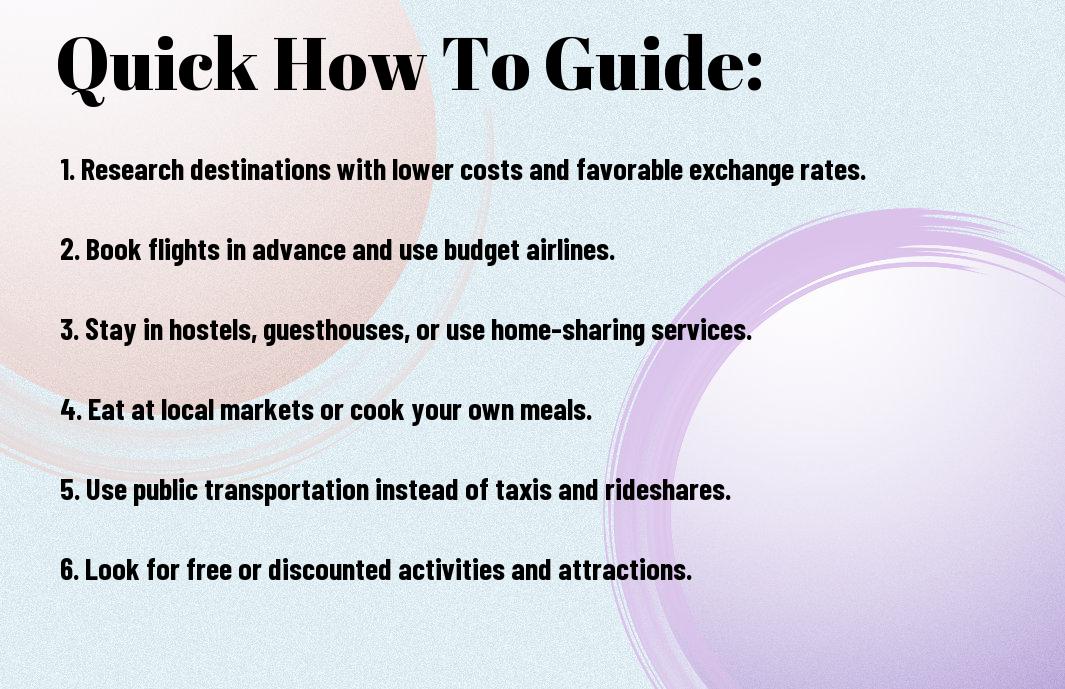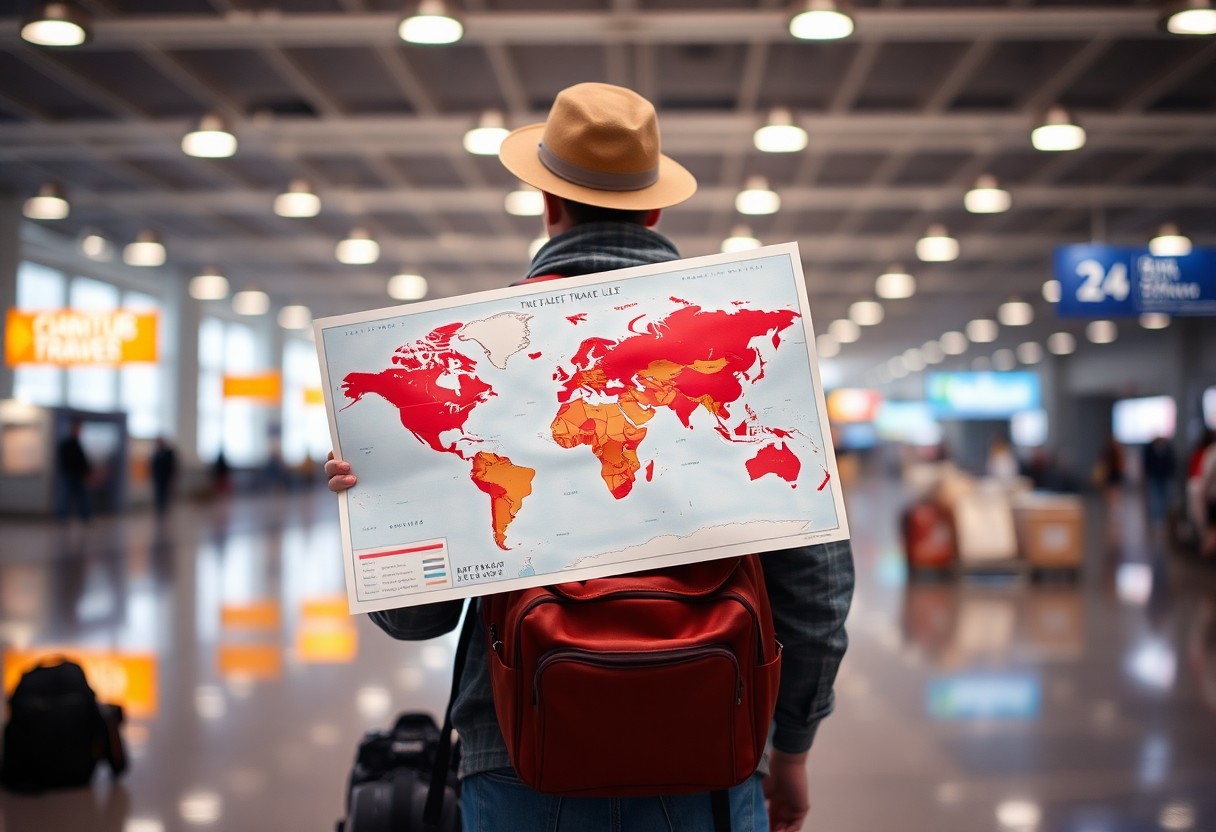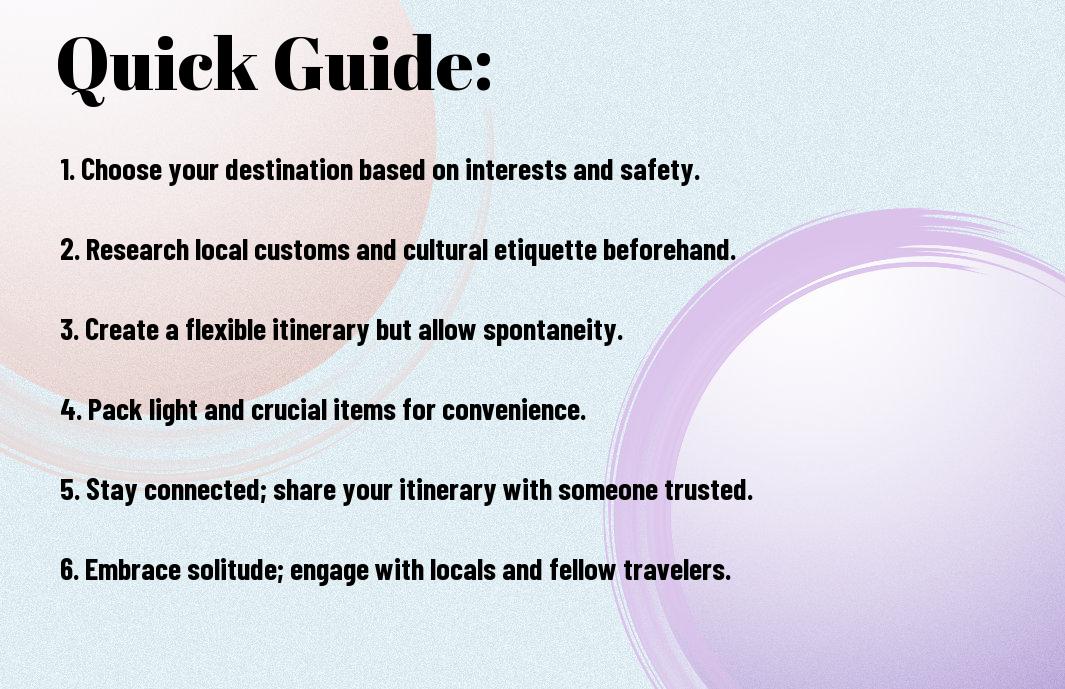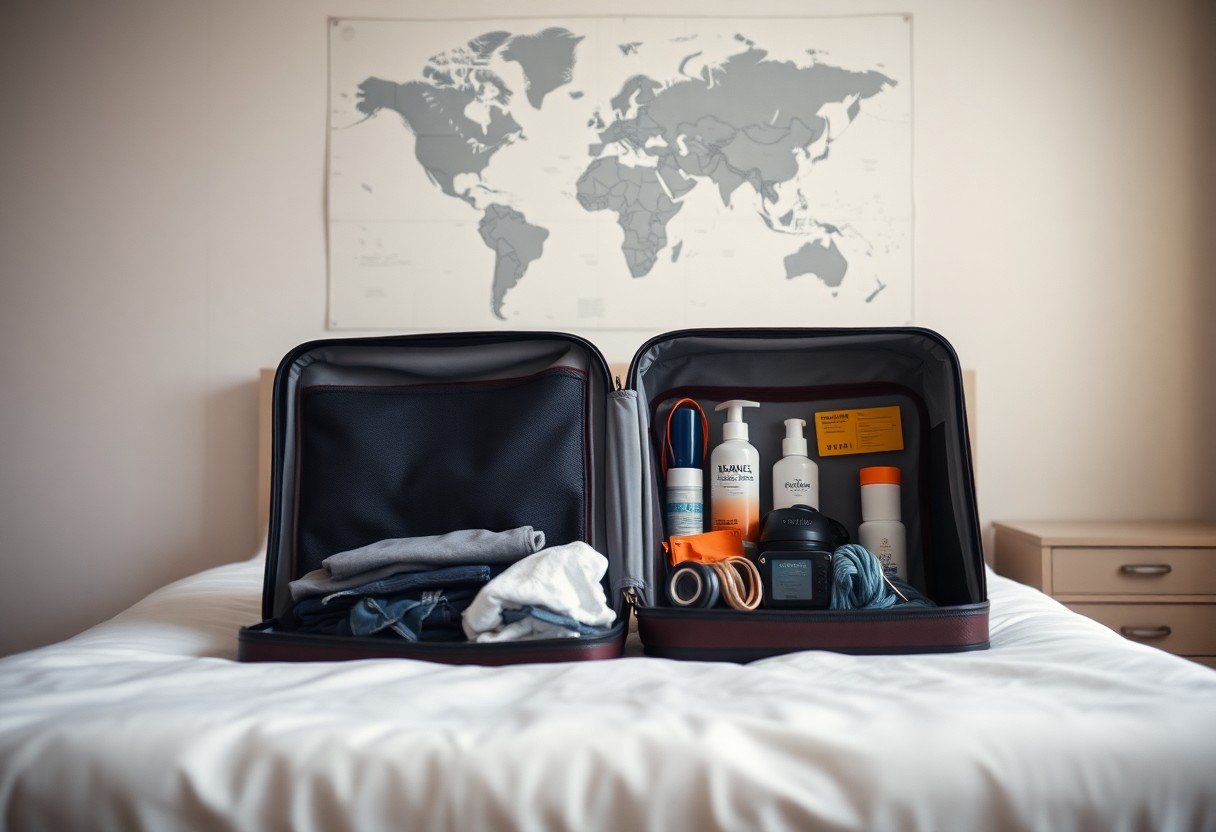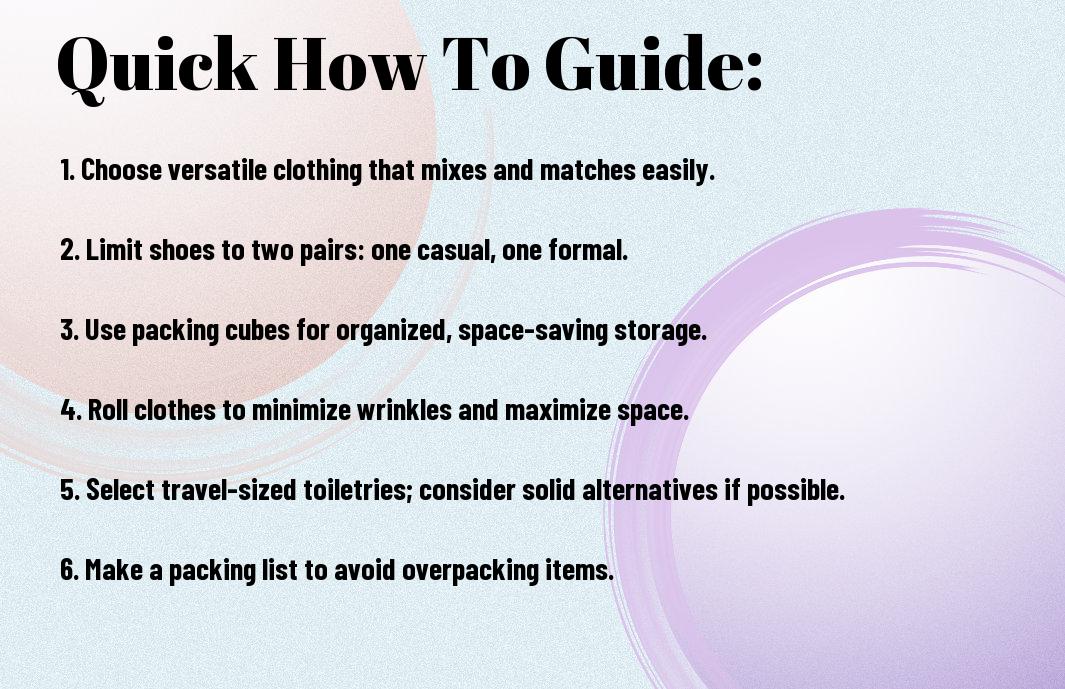Just begining on your first travel adventure? You’re in for an unforgettable experience! This list highlights the top 10 destinations that offer something special for first-time travelers, from breathtaking landscapes to rich cultural experiences. Whether you crave vibrant cities, serene nature, or historical marvels, these locations will ignite your wanderlust and provide you with memories to cherish forever. Prepare to explore the world with your travel bucket list in hand!
Key Takeaways:
- Diverse Cultures: Explore destinations that offer a rich tapestry of cultural experiences, from bustling markets to traditional festivals.
- Natural Wonders: Visit breathtaking landscapes such as mountains, beaches, and national parks that showcase the beauty of nature.
- Historical Sites: Discover ancient landmarks and monuments that tell the stories of past civilizations and their significance.
- Local Cuisine: Indulge in regional dishes that highlight the unique flavors and culinary traditions of each destination.
- Adventure Activities: Engage in thrilling activities such as hiking, snorkeling, or city exploring that cater to various adventure levels.
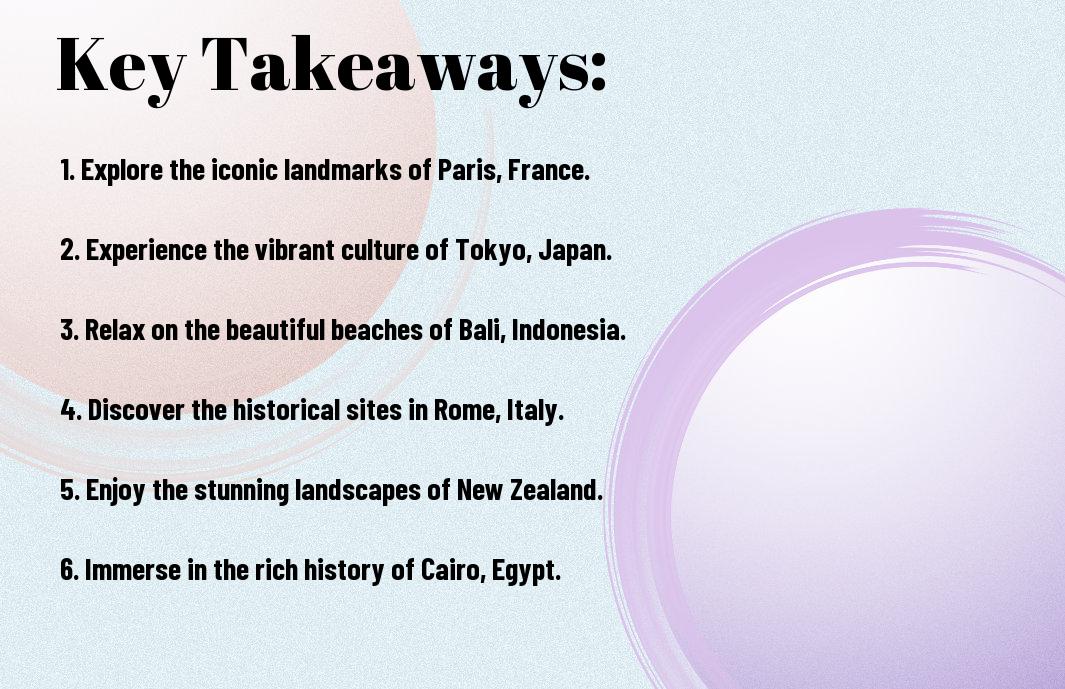

Paris, France
Before you set off on your journey, prepare for the magic of Paris, where romance and culture intertwine. The City of Lights is renowned for its iconic landmarks, delicious cuisine, and vibrant street life. With stunning architecture and world-class museums, every corner of this city holds something captivating for first-time travelers. Be sure to enjoy a leisurely stroll along the Seine River or indulge in a fresh croissant at a local café.
Eiffel Tower
You cannot visit Paris without experiencing the iconic Eiffel Tower. This architectural marvel stands tall at 1,083 feet, offering breathtaking views of the city from its observation decks. Whether you choose to ascend during the day to appreciate the scenery or visit at night to witness the mesmerizing light show, the Eiffel Tower is a bucket-list experience.
Louvre Museum
On your trip, a visit to the Louvre Museum will immerse you in art and history. Home to thousands of works, including the Mona Lisa and the Venus de Milo, the museum is one of the largest and most visited in the world. You’ll find not only historical artifacts but also stunning architecture that enhances your overall experience.
For instance, the Louvre spans over 782,910 square feet, making it an adventure just to navigate. You can spend hours exploring its vast galleries, and guided tours can help you make the most of your visit. Don’t miss a chance to explore the glass pyramid entrance, a striking contrast to the historic palace. Each piece of art tells a story, adding depth to your understanding of human creativity throughout the ages.
Rome, Italy
Clearly, Rome is a destination that captivates the heart and imagination of first-time travelers. With its rich history, stunning architecture, and mouth-watering cuisine, it’s no wonder this city is among the 10 Best Destinations for First Time International Travelers. Every corner of Rome tells a story, making it the perfect place to immerse yourself in culture and experience the beauty of Italy.
Colosseum
Assuming you stand before the iconic Colosseum, you’ll feel as if you’ve traveled back in time to ancient Rome. This monumental amphitheater, known for its gladiatorial battles and grand spectacles, is a must-see. Be sure to capture the stunning views both outside and inside, and consider taking a guided tour to learn about its incredible history.
Vatican City
Even a visit to Vatican City, the world’s smallest independent state, is an necessary part of your Roman adventures. Home to St. Peter’s Basilica and the Sistine Chapel, it’s packed with artistic masterpieces and spiritual significance. Exploring this sacred site will leave you in awe of its beauty and history.
Any trip to Vatican City is incomplete without admiring Michelangelo’s breathtaking fresco in the Sistine Chapel. As you enter, the stunning artwork captures the essence of artistry and faith, offering you a profound connection to the past. Don’t overlook the chance to stroll around St. Peter’s Square, where the grandeur of its architecture and the ambiance of worship combine to create an unforgettable experience.
Tokyo, Japan
Unlike any other city in the world, Tokyo is a dynamic blend of ancient traditions and cutting-edge innovation. You’ll be captivated by the contrast between serene temples and futuristic skyscrapers, making it an ideal destination for your first travel experience. Whether you’re indulging in world-renowned cuisine or exploring vibrant neighborhoods filled with culture, Tokyo offers a unique adventure that is both exhilarating and enriching.
Shibuya Crossing
With its iconic scramble, Shibuya Crossing is a must-see spectacle that embodies the dynamic spirit of Tokyo. As you stand on the sidelines waiting for the signal, you’ll witness hundreds of people crossing from all directions, creating a mesmerizing flow of movement. This bustling intersection provides an excellent backdrop for memorable photos, making it an imperative stop on your journey through the city.
Senso-ji Temple
Shibuya, while exciting, is just one part of your Tokyo experience. You should also explore Senso-ji Temple, Tokyo’s oldest temple located in Asakusa. It offers a glimpse into Japan’s rich history and culture, surrounded by traditional shops and street vendors. As you enter through the iconic Kaminarimon gate, you’ll be struck by the grandiosity and serenity of the temple grounds.
Plus, Senso-ji Temple is not only a spiritual haven but also a lively marketplace. The approach to the temple, known as Nakamise Street, features numerous stalls selling tempting local snacks and unique souvenirs. You can sample freshly fried ningyo-yaki (small cakes filled with sweet red bean paste) while enjoying the vibrant atmosphere, making your visit a delightful blend of culinary treats and cultural immersion.
New York City, USA
Many consider New York City to be the ultimate destination for first-time travelers, offering an exhilarating blend of culture, history, and iconic landmarks. From the bright lights of Times Square to the stunning skyline seen from the Top of the Rock, you’ll find endless opportunities to explore. Whether you’re indulging in world-class cuisine or enjoying a Broadway show, NYC promises a vibrant experience that leaves a lasting impression.
Statue of Liberty
City dwellers and visitors alike regard the Statue of Liberty as a symbol of freedom and hope. You can take a ferry from Battery Park to Liberty Island, where the statue welcomes you with open arms. This UNESCO World Heritage site not only offers stunning views of the city but also serves as a powerful reminder of America’s history and ideals.
Central Park
Some of the best moments in New York can be enjoyed at Central Park, an expansive urban oasis that provides a peaceful retreat from the bustling city. As you stroll along its winding paths, you’ll encounter verdant meadows, serene lakes, and lively playgrounds. Whether you choose to rent a bike, have a picnic, or simply take in the natural beauty, Central Park is a refreshing escape that showcases the city’s commitment to green spaces.
Liberty Island is not the only place to enjoy green vistas; Central Park is a testament to New York’s dedication to nature amidst the urban jungle. Spanning over 840 acres, this masterpiece features every corner of tranquility and activity. You’ll find stunning landscapes, hidden sculptures, and cultural hubs such as the Central Park Zoo and the Great Lawn. Come spring, cherry blossoms bloom, while fall welcomes vibrant foliage, making it an all-season must-visit that reflects the dynamic spirit of NYC.
Sydney, Australia
All first-time travelers should experience the vibrant culture and stunning landscapes of Sydney. With iconic landmarks, beautiful beaches, and a lively arts scene, this Australian metropolis offers something for everyone. You can explore the historic districts, savor exquisite cuisine, or simply enjoy the breathtaking views of the Sydney Harbour. From the bustling city life to serene coastal spots, Sydney promises an unforgettable adventure to ensure your trip starts off right.
Sydney Opera House
House the grandeur of the Sydney Opera House, an architectural marvel that dominates the city skyline. With its distinctive sail-like design, this world-renowned venue hosts a myriad of performances ranging from opera to ballet, showcasing the rich artistic culture of Australia. You can take a guided tour to explore into its fascinating history or simply enjoy its stunning facade from the vibrant harbour promenade.
Bondi Beach
While you are in Sydney, don’t miss the iconic Bondi Beach, known for its golden sands and rolling waves. This beach is a hotspot for surfers, sunbathers, and thrill-seekers alike. Whether you want to take a surf lesson or enjoy a picnic along the shore, Bondi offers a laid-back atmosphere that is hard to resist.
Any visit to Bondi Beach can be complemented with a coastal walk along the scenic Bondi to Coogee trail. This captivating route provides spectacular views of cliffs, coves, and rock pools, allowing you to take in the stunning natural beauty of the coastline. Make sure to stop by the local cafes and shops to experience the local lifestyle, as it truly embodies the spirit of Australian beach culture.
Barcelona, Spain
To experience a blend of artistic brilliance and vibrant culture, Barcelona is a must-see destination for first-time travelers. This stunning city offers a rich tapestry of history, architecture, and culinary delights that will leave you captivated. From the iconic works of Antoni Gaudí to the picturesque beaches, Barcelona is a city that beckons you to explore its many facets. Don’t miss the opportunity to indulge in tapas, immerse yourself in local traditions, and take in the stunning Mediterranean views.
Sagrada Familia
Even if you’re not an architecture enthusiast, the Sagrada Familia will leave you speechless. This breathtaking basilica, designed by Antoni Gaudí, showcases an extraordinary blend of Gothic and Art Nouveau styles. Its towering spires and intricate facades reflect a vision that has captivated visitors for over a century. As you step inside, the colorful stained glass windows create a kaleidoscope of light, enhancing the spiritual ambiance of this unfinished masterpiece. A visit here is an unforgettable experience that captures the essence of Barcelona.
Park Güell
On your journey through Barcelona, make sure to include Park Güell in your itinerary. This vibrant park is another masterpiece crafted by Antoni Gaudí, showcasing his unique architectural style and imagination. The colorful mosaics, winding pathways, and whimsical structures make it a delightful haven for art lovers and tourists alike.
You can stroll through the park to discover its fascinating sculptures and enjoy panoramic views of the city. The vivid mosaics and the iconic lizard fountain at the entrance are perfect spots for memorable photos. As you wander the winding paths, you’ll feel a sense of wonder enveloping you, making Park Güell an imperative stop for anyone wanting to experience the creative spirit of Barcelona.
Cairo, Egypt
Keep your camera ready as you wander through the vibrant streets of Cairo, Egypt’s capital, rich in history and culture. This bustling metropolis famously merges ancient wonders with modern life, providing an unforgettable experience for first-time travelers. Explore the countless museums, bustling markets, and exquisite cuisine, all while soaking in the captivating atmosphere that this city has to offer.
Pyramids of Giza
Cairo is home to the iconic Pyramids of Giza, one of the Seven Wonders of the Ancient World. You’ll be awestruck as you stand before these colossal structures, tombs for pharaohs that have remained intact for millennia. A visit here is an enriching experience, allowing you to learn about Egypt’s rich history while exploring the stunning architectural feats that have captivated generations.
Nile River
Cairo boasts the majestic Nile River, the world’s longest river, which runs gracefully through the heart of the city. You can enjoy a leisurely felucca sail or dine riverside to experience the tranquility of this ancient waterway. The Nile is not just a breathtaking sight; it’s deeply ingrained in the culture and history of Egypt, offering you a unique perspective on life along its banks.
With options for sunset cruises, you can witness breathtaking views of Cairo’s skyline while the sun dips below the horizon. The river is a lifeline for the city and serves as a reminder of its historical significance. As you sail, you’ll have the opportunity to see iconic landmarks from a different angle, making this a magical addition to your Cairo itinerary.
Rio de Janeiro, Brazil
After setting foot in Rio de Janeiro, you’ll be captivated by its stunning landscapes and vibrant culture. Nestled between lush mountains and pristine beaches, this Brazilian gem offers a blend of urban excitement and natural beauty. From the iconic Sugarloaf Mountain to the lively neighborhoods filled with samba music, your first visit to Rio promises unforgettable experiences and breathtaking sights that will leave you yearning for more.
Christ the Redeemer
Assuming you’re begining on this journey, your first must-see landmark is the magnificent Christ the Redeemer statue. Perched on Corcovado Mountain, this towering figure not only depicts Christ with open arms but also represents Rio’s warmhearted hospitality. As you ascend via a cog train, prepare to be awe-inspired by panoramic views of the city that unfold before you.
Copacabana Beach
The legendary Copacabana Beach is a vibrant hub where you can soak up the sun while surrounded by a lively atmosphere. This iconic stretch of golden sand invites you to take a leisurely stroll along its promenade, chatter with locals, or indulge in delicious Brazilian street food. The energy here is infectious, and you’ll find yourself drawn into the rhythm of beach life in Rio.
Brazil boasts some of the most stunning beaches in the world, and Copacabana is no exception. Spanning approximately 4 kilometers, it’s a perfect spot for swimming, sunbathing, or people-watching. As you relax on the sand, you’ll see locals playing beach volleyball or sipping coconut water. In the evenings, the beach transforms into a lively social scene, ideal for enjoying the sunset while savouring fresh seafood from local vendors.
Bangkok, Thailand
Now, imagine stepping into a bustling metropolis that seamlessly blends tradition and modernity. Bangkok is a vibrant city filled with rich history, stunning temples, and an incredible food scene. As a first-time traveler, you’ll be captivated by the sights, sounds, and flavors that this dynamic capital offers. From ancient architecture to lively street markets, Bangkok is a sensory delight that promises unforgettable experiences.
Grand Palace
You’ll be awestruck when you visit the Grand Palace, a breathtaking complex that once served as the residence of Thai kings. This iconic landmark showcases stunning architecture, intricate details, and the revered Emerald Buddha. Be sure to dress appropriately and take your time exploring the ornate buildings and lush gardens. Your visit to this historic site will give you a deeper appreciation for Thailand’s rich cultural heritage.
Floating Markets
There’s nothing quite like exploring Bangkok’s famous floating markets, where you can experience traditional Thai culture firsthand. These vibrant markets, with their colorful boats and lively vendors, offer a unique shopping experience filled with delicious street food and local crafts. You’ll feel transported as you navigate the canals while savoring mouthwatering delicacies.
For instance, the Damnoen Saduak Floating Market is one of the most popular spots, where you can taste fresh fruits, coconut pancakes, and boat noodles right from the vendors’ boats. The atmosphere is electric, with friendly locals calling out to you while you take in the sights. Alternatively, the Taling Chan Floating Market offers a more laid-back vibe, perfect for leisurely browsing and enjoying a meal by the water. No matter which market you choose, you’re sure to leave with both delicious treats and cherished memories.
Cape Town, South Africa
Not only is Cape Town famous for its stunning landscapes, but it also offers a rich blend of history, culture, and adventure. This captivating city, nestled between the mountains and the ocean, is perfect for first-time travelers eager to explore vibrant neighborhoods, savor delicious cuisine, and engage with friendly locals. From the iconic Table Mountain to the historic streets of Bo-Kaap, Cape Town promises unforgettable experiences that will leave you wanting more.
Table Mountain
For an awe-inspiring view, ascend Table Mountain, one of the New7Wonders of Nature. A cable car ride or invigorating hike will lead you to the summit, where you’re greeted by panoramic views of the city, ocean, and surrounding peaks. The diverse flora and fauna atop the mountain add to its charm, making it an vital stop on your Cape Town adventure.
Robben Island
For a powerful and educational experience, visit Robben Island, the site where Nelson Mandela was imprisoned for 18 years. This UNESCO World Heritage Site offers guided tours led by former political prisoners, allowing you to hear firsthand accounts of their struggles and resilience. The visit immerses you in South Africa’s rich history and the fight for freedom.
Town offers an intricate glimpse into South Africa’s past, as your tour across Robben Island reveals the harsh realities faced by political dissidents. You’ll explore the prison cells and discover the courageous stories of those who fought against apartheid. The ferry ride to the island also provides stunning views of Table Mountain, creating a memorable loop that connects historical context with breathtaking scenery.
To wrap up
As a reminder, exploring the top 10 must-see destinations for first-time travelers can greatly enhance your travel experience and create unforgettable memories. Each destination offers unique attractions, cultural insights, and opportunities for adventure that cater to diverse interests. As you initiate on your journey, be sure to immerse yourself in the local culture, savor authentic cuisine, and connect with fellow travelers. With proper planning and an open mind, you can truly make the most of your travels and uncover the beauty the world has to offer.
Q: What are some of the top must-see destinations for first-time travelers?
A: For first-time travelers, some of the top must-see destinations include Paris, France, known for its iconic Eiffel Tower and rich art history; Kyoto, Japan, famous for its beautiful temples and traditional tea houses; and Rome, Italy, which offers stunning historical sites like the Colosseum and the Vatican. Other notable destinations are New York City, USA, renowned for its vibrant culture and landmark skyscrapers; Sydney, Australia, celebrated for its stunning harbor and the Sydney Opera House; and Cape Town, South Africa, known for its breathtaking landscapes and the scenic Table Mountain.
Q: How can first-time travelers prepare for their trips to these destinations?
A: First-time travelers can prepare for their trips by researching each destination’s culture, customs, and local cuisine. It’s beneficial to create a rough itinerary, including must-visit attractions and experiences. Travelers should also consider booking accommodations in advance and exploring transportation options, such as public transit or ride-sharing services. Learning a few basic phrases in the local language can enhance the travel experience, while also ensuring that travelers stay informed about safety guidelines and health requirements for their destinations.
Q: What tips can you provide to maximize the experience at these must-see destinations?
A: To maximize the experience at must-see destinations, travelers should immerse themselves in the local culture by trying traditional foods and participating in local festivals or events. Engaging with locals can provide unique insights and recommendations that may not be found in guidebooks. It is also advisable to explore off-the-beaten-path attractions to escape the tourist crowds and discover hidden gems. Finally, allocating time for leisurely walks and spontaneous adventures can lead to unforgettable experiences, allowing first-time travelers to fully appreciate the essence of each destination.
